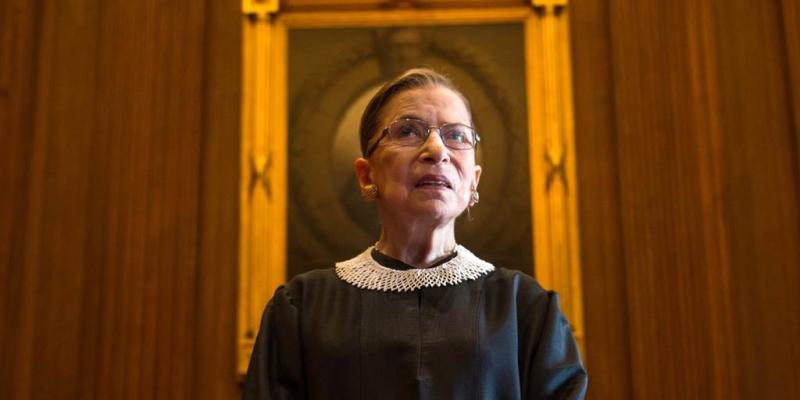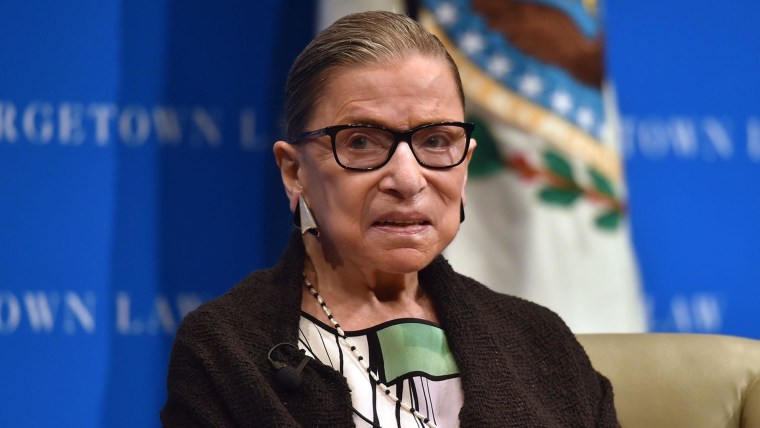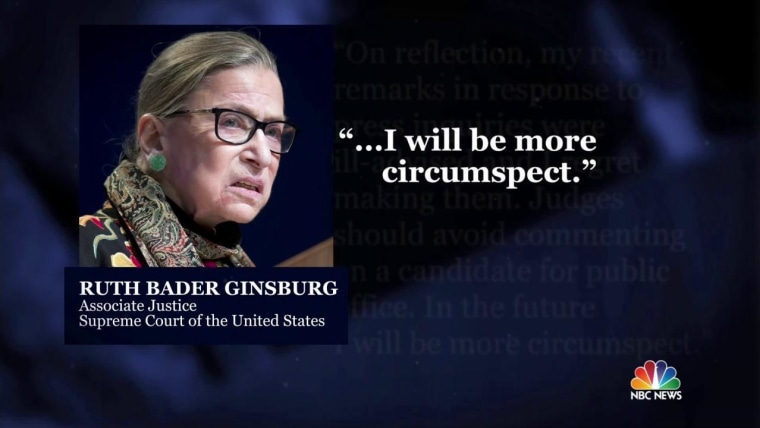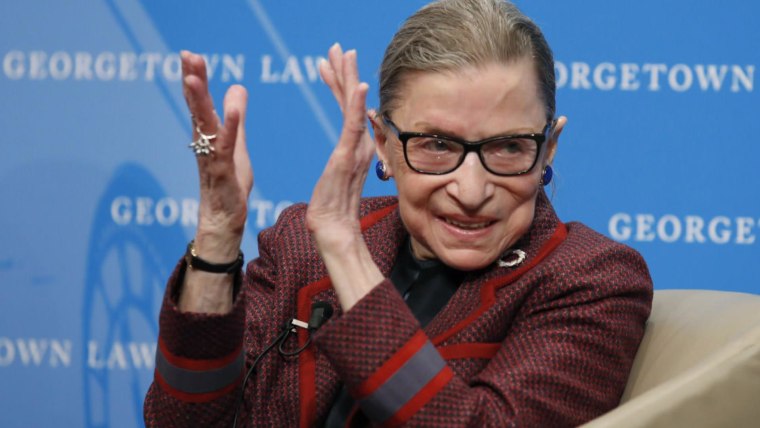Supreme Court Justice Ruth Bader Ginsburg dies at 87
Category: News & Politics
Via: perrie-halpern • 4 years ago • 12 commentsBy: Elizabeth Chuck, Alex Johnson and Dareh Gregorian



Ruth Bader Ginsburg, the Supreme Court justice who was as pioneering as she was brash, died on Friday, the court said. She was 87.
The court said Ginsburg, a lifelong champion of women's rights and a fierce advocate for gender equality, died "surrounded by her family at her home in Washington, D.C., due to complications of metastatic pancreas cancer."
Chief Justice John Roberts said: "Our Nation has lost a jurist of historic stature. We at the Supreme Court have lost a cherished colleague. Today we mourn, but with confidence that future generations will remember Ruth Bader Ginsburg as we knew her — a tireless and resolute champion of justice."
Despite her diminutive stature, Ginsburg was larger than life, both on and off the bench. Viewed as a feminist icon, she broke countless barriers, never shying away from making contentious comments along the way — with everything from her high court opinions to her octogenarian workout routines, earning her the nickname the "Notorious R.B.G." by her rabid fan base.
Diagnosed with cancer four times, Ginsburg had had numerous health scares, including several recent hospitalizations. Her death will open a pivotal seat on the court less than 50 days before the election.
NPR reported that in her final days, Ginsburg dictated a statement to her granddaughter Clara Spera declaring, "My most fervent wish is that I will not be replaced until a new president is installed."
Senate Majority Leader Mitch McConnell said Friday night he has no intention of waiting and will put forward whoever President Donald Trump nominates.
"President Trump's nominee will receive a vote on the floor of the United States Senate," McConnell said in a statement.

Ginsburg says she has 'at least 5 more years' on the bench
Senate Minority Leader Chuck Schumer, who hailed Ginsburg as "a champion for justice" and "a trailblazer for women, tweeted, "The American people should have a voice in the selection of their next Supreme Court Justice. Therefore, this vacancy should not be filled until we have a new president."
The line was the exact same phrase McConnell used in 2016 to block then-President Barack Obama's nominee to filled the seat left vacant by the death of Justice Antonin Scalia.
The news broke as Trump was speaking at a rally in Minnesota. Unaware of her death, he said during his speech that "the Supreme Court is so important. The next president will get one, two, three, or four supreme court justices."
After learning the news, Trump told reporters, "I'm actually saddened to hear that."
"Whether you agreed or not, she was an amazing woman who led an amazing life," Trump said.
Former President George W. Bush issued a statement saying "Justice Ginsburg loved our country and the law. Laura and I are fortunate to have known this smart and humorous trailblazer, and we send our condolences to the Ginsburg family."
A sharp-tongued moderate liberal, Ginsburg was appointed to the Supreme Court by President Bill Clinton in 1993 and had repeatedly vowed to stay on as long as her health permitted, even when some liberals pressured her to step down during the Obama administration so a Democratic president could be guaranteed to appoint her successor.
"Tell me who the president could have nominated this spring that you would rather see on the court than me?" was the justice's tart response at the time.
Those who faced her ire were offered no protection by political prowess or fame. She once called then-presidential candidate Donald Trump a "faker" and publicly criticized NFL quarterback Colin Kaepernick for refusing to stand during the national anthem. She later apologized for the criticism of Trump and of Kaepernick.

2016: Ginsburg apologizes for 'ill-advised' criticism of Trump
Despite ruffling some feathers, Ginsburg had a fervent following, with devotees who cared about her rigorous fitness regimen almost as much as they cared about how she voted on the high court. Her likeness appeared on female empowerment T-shirts and other paraphernalia.
Ginsburg, who was only the second female justice to sit on the nation's highest court, was a fierce crusader for women's rights. She credited her mother, who died of cancer a day before Ginsburg graduated from high school, with influencing her advocacy for women.
"My mother told me two things constantly: One was to be a lady, and the other was to be independent. The latter was something very unusual ... because for most girls growing up in the 1940s, the most important degree was not your B.A., but your 'M.R.S.,'" Ginsburg said in an appearance at Duke University in 2005.
"My mother told me two things constantly. One was to be a lady, and the other was to be independent."
Her path to the Supreme Court was laden with obstacles.
Born on March 15, 1933, in Brooklyn, New York, Ruth Joan Bader graduated with a degree in government at top of her class from Cornell University in 1954, the same year she married her college sweetheart, Martin Ginsburg, who became a leading tax lawyer.
The couple moved to Fort Sill, Oklahoma, where he was stationed with the Army Reserve. She worked for the Social Security Administration — only to be demoted after becoming pregnant with their first child, who was born in 1955.
Returning East, Ginsburg enrolled in Harvard Law School in 1956 before transferring to Columbia Law School. She tied for first in her class when she received her law degree in 1959. But when she applied for jobs afterward, she discovered that most law firms didn't want her, despite her sparkling credentials.
"In the Fifties, the traditional law firms were just beginning to turn around on hiring Jews. But to be a woman, a Jew and a mother to boot — that combination was a bit too much," she once wrote.
Ginsburg eventually got a job clerking for U.S. District Judge Edmund Palmieri in Manhattan before she moved to Rutgers University, where she was a law professor from 1963 to 1972.
She became pregnant with her second child while teaching at Rutgers, and, fearing she would get fired, hid her growing stomach by wearing baggy clothes. She gave birth over summer break in 1965 and returned to work in the fall. She then taught at Columbia, where she became the university's first female tenured professor.
Ginsburg devoted herself to reversing the social norms that had made her own career so difficult.
In 1972, the Ginsburgs — Martin Ginsburg, who died from cancer in 2010, was a highly respected tax lawyer in his own right — led the legal team that successfully argued an appeal on behalf of a man who was denied a tax deduction for dependent-care expenses related to his support for his 89-year-old mother.
The 10th U.S. Circuit Court of Appeals found that the IRS regulation under which the deduction was denied was "a special discrimination premised on sex alone, which cannot stand" — a ruling that became crucial to decades of sexual discrimination jurisprudence and a central part of the 2018 movie "On the Basis of Sex," written by Andrew Stiepleman, Ginsburg's nephew.
(A biographical documentary, "RBG," also became a surprise hit in mid-2018 as Ginsburg emerged as a symbol for activists, especially women, opposed to the administration of President Donald Trump.)

May 2018: Ruth Bader Ginsburg documentary 'RBG' is surprise box-office hit
Ginsburg would continue to challenge gender-based laws throughout the 1970s as a volunteer lawyer for the American Civil Liberties Union, for which she also served as founder and director of the Women's Rights Project.
In 1980, President Jimmy Carter appointed her to the U.S. Court of Appeals for the District of Columbia Circuit. She served in that role until Clinton appointed her to the Supreme Court.
Throughout her tenure on the high court, Ginsburg remained at the forefront of gender equality law.
In 1996, she wrote the majority decision that struck down Virginia Military Institute's men-only admissions policy as violating the 14th Amendment.
"Women seeking and fit for a VMI-quality education cannot be offered anything less," Ginsburg wrote.
While she has become a heroine to many activists, she has said she didn't consider herself one of them at first.
"I did not think of myself as a feminist in the 1950s," she said in a 1988 speech. She fought for women's legal rights, she said, "for personal, selfish reasons."
And she never expected to end up on the Supreme Court. In a 1993 New York Times profile, childhood friends remembered the girl nicknamed "Kiki" Bader as the one who chipped her tooth while twirling batons for her high school football team's games.
"She was very modest, and didn't appear to be super self-confident," Ann Burkhardt Kittner, a close high school friend, told The Times. "She never thought she did well on tests, but, of course, she always aced them."
As a justice, Ginsburg voted for workers' rights and the separation of church and state. Her opinions and dissents often drew attention for their blunt but eloquent explanations of her positions.
Her strongly worded dissent in Ledbetter vs. Goodyear Tire & Rubber Co. in 2007 explicitly called on Congress to relax the statute of limitations on equal pay lawsuits, observing that "a worker knows immediately if she is denied a promotion or transfer. Compensation disparities, in contrast, are often hidden from sight."
President Barack Obama signed the Lilly Ledbetter Fair Pay Act, named in honor of the plaintiff, in 2009.
In 2013, Ginsburg joined the majority in striking down the Defense of Marriage Act, or DOMA, ruling that same-sex couples married in states where such weddings are legal are entitled to the same federal benefits as heterosexual couples.
In one of the case's most striking moments, Ginsburg said at oral arguments that DOMA institutionalized "two kinds of marriage: the full marriage, and then this sort of skim milk marriage."
Just a few months later, she became the first Supreme Court justice to officiate at a same-sex wedding, presiding over the marriage of her longtime friend Michael Kaiser to economist John Roberts at the John F. Kennedy Center for the Performing Arts in Washington, of which Kaiser was then president.
And in a searing dissent to the court's 5-to-4 Hobby Lobby contraception ruling in 2014 — which held that the government can't require certain employers to provide insurance coverage for birth control that's in conflict with their religious beliefs — she wrote: "The court, I fear, has ventured into a minefield."
Ginsburg had overcome serious health problems before: In February 2009, when she was 75, she had surgery to remove a small tumor in her pancreas. Pancreatic cancer is one of the deadliest cancers, spreading quickly and seldom detected early, and like many other patients, she had no symptoms. In her case, the tumor was discovered early enough to remove. In summer 2019, Ginsburg again had a brush with cancer in her pancreas, receiving radiation therapy for a malignant tumor.
She also had colon cancer in 1999, for which she received treatment, and a heart stent put in in 2014. In July 2018, Ginsburg was hospitalized after having broken three ribs; at the end of that year, she had surgery for early-stage lung cancer.
Ginsburg is survived by her children, Jane and James. While she was serious about the causes that were important to her, she also made time to have fun: In November 2016, at age 83, she had a small speaking role on the opening night of "The Daughter of the Regiment," a show at the Washington National Opera.
Asked beforehand by NPR whether she thought she would have stage fright when it came time to step out of her comfort zone as a Supreme Court justice and perform in the opera, Ginsburg just laughed.
"What's to be nervous about?" she said.







RBR:
Only kind words about the passing of the late great RBG here. Any other will be removed.
Thanks for the warning - As it should be!
Let me credit Justice Ginsberg for her enormous legacy. She had a strategy to promote gender equity through the law, that preceded her appointment to the Supreme Court.
She accomplished a lot for women.
What I liked most about her was that she big enough to apologize for statements made in a moment of anger - something I can relate to.
The Court has lost it's Liberal leader.
Sad day for America. You will be missed by every patriotic American. RIP RGB.
Ruth Bader Ginsburg was a consequential justice who made a lasting contribution to the Supreme Court and American jurisprudence. Ginsburg's irrepressible personality may soon be forgotten but her presence on the court will be remembered far into the future. Justice Ginsburg's legacy in the law is a fitting memorial.
If I may add some information about RBG that probably isn't known by NT members.
Early in her tenure as a Justice she was not well informed on Indian law and wrote the majority opinion in a case that was truly detrimental to Native Americans.
Her opinion evolved with time and she became an advocate of Native American cases.
Condolences are coming from all over Indian Country even with her early decisions on Indian law she was greatly respected by Indians especially Indian lawyers.
Just a few short months ago she told a number of people that she was hopeful that the next Justice would be a Native American. (there is one that is a federal judge currently that would be perfect)
RBG was a fighter and I have a great deal of respect for the lady.
May your ancestors guide you on the path of souls, RBG. You will be missed.
RIP Notorious RBG
An amazing judge. An amazing woman. An amazing person.
Fuck.
Don't get me wrong I love her, but shit... bad timing lol.
I think she would laugh.